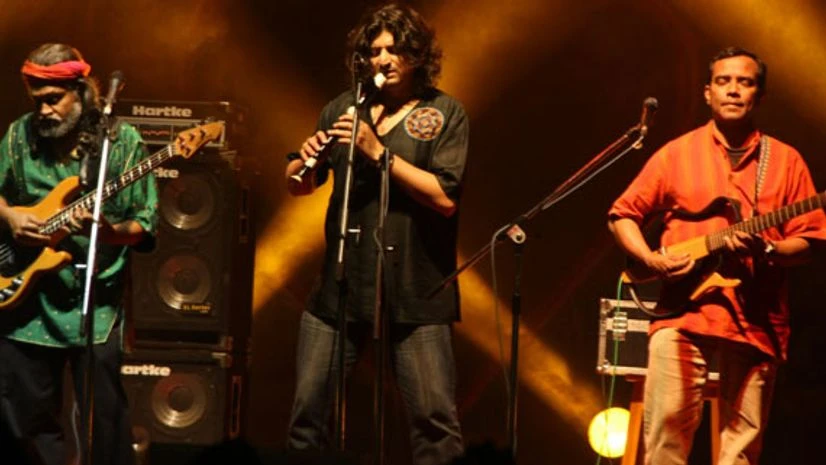OCEAN TO OCEAN: A MEMOIR
Author: Susmit Sen with Sehba Imam
Publisher: Harper Collins
Pages: 149 pages (plus one CD)
Price: Rs 699
Also Read
He founded Indian Ocean, arguably one of India’s most creative bands known for its fusion of folk and rock. Two tumultuous decades later, after parting ways with Indian Ocean, guitarist Susmit Sen has penned a memoir of his years making music, jabbing at jobs, travelling across the world and finding his own voice. In the process, he has chronicled the astonishing career graph of an alternate rock band that chose revolutionary folk songs over popular Western standards — and still achieved commercial success.
Indian Ocean began in 1990, a ragtag group of self-taught musicians united by their passion for music — Aseem Chakravarti, Amit Kilam, Rahul Ram and Sen. They were young, bright and committed more to social causes than to commercial success. Consequently, their music was an experimental blend of social anthems, folksy tunes and brilliant percussion. It was impossible, as it is today, to label their highly individual music under any specific genre, though people tried. With few resources, minimal sets and costumes, the Delhi-based band established an identity for itself across the country and abroad. Sen writes an entertaining, personal account of these years, rehearsing their first album, Indian Ocean, in the Noida home of his parents-in-law, leaving them to face the ire of the neighbours over the loud music that disturbed their peace.
Their early years were exciting but not easy. Money was tight as other than a group of devoted supporters (mostly friends and family), Indian Ocean had not yet received much commercial success. By 1997, the band settled down with a regular rehearsal venue (a friend’s home on One Khajoor Road, later commemorated in an eponymous album). Their second album, Desert Rain, became a success, and in 2000, when they released Kandisa to rave reviews, it seemed as if Indian Ocean had finally arrived.
Fame, however, led to creative differences and disharmony. As Sen’s memoir begins the unsparing cataloguing of these differences, his narrative deteriorates considerably. There is something inherently distasteful about the one-sided picture that a tell-all memoir paints. Sen writes about the band slowly losing its creative edge, choosing crowd-pleasing lyrics over the more instrumental sounds that it had originally started out with: “I began to feel that our music was gradually being driven not by what we liked to make, but what people expected us to make... It was when we were working on Jhini that I felt the first tinges of creative dissatisfaction. The synergy we used to have as a band seemed to be missing.”
He talks about how while on stage, his band mates spontaneously burst into a rendition of a popular nursery rhyme just because the audience was enjoying it. He also mentions his dissatisfaction with the band’s growing focus on stage presence that forced him to wear brighter colours that reflected the light better. He writes sniffily, “…there were times when we went overboard with the silk and colours and ended up looking like different flavoured lozenges in a packet.”
These creative differences, says Sen, grew into a void following the unexpected death of bandmate Chakravarti in 2009. He is, significantly, the only band member who merits praise from Sen in the book. From his poignant tribute, it seems evident that amongst all his bandmates, he shared the best creative chemistry with Chakravarti. His death created for Sen a void too deep to fill and became the tipping point that eventually resulted in his leaving Indian Ocean.
Throughout the book, there are many places where the fair-minded reader is left thirsting for rebuttals by Sen’s former band mates. To be fair to Sen, memoirs by definition are an individual’s perspective. However, even the selection of photographs in the book seems one-sided. While there are scores of pictures of Sen, his family and friends, there are hardly a handful of photographs of the band. All in all, it is disappointing that at the end of the book, the reader is left with more of the sense of Sen’s alienation from Indian Ocean and his band mates than an eye-witness account of the most exciting years of Indian rock history.
The brightest aspect of the memoir is the Ocean To Ocean, Sen’s first recorded output with the Susmit Sen Chronicles, the new band he has formed with Varun Gupta, Anirban Ghosh, Nikhil Vasudevan, Amit Sharma and Sudhir Rikhari. Unlike the memoir, the album is unfailingly harmonious and melodious, featuring interesting collaborations with artists from across the globe — like Bernie Marsden of White Snake and Hungarian piano-accordionist Zoltán Orosz. Yet, the choice of title as well as music seem eerily reminiscent of the signature folk-rock sounds of his ex-band. The memoir and album both make it amply clear that Sen may have left Indian Ocean, but the ocean still hasn’t left him. Not yet, anyway.

)
